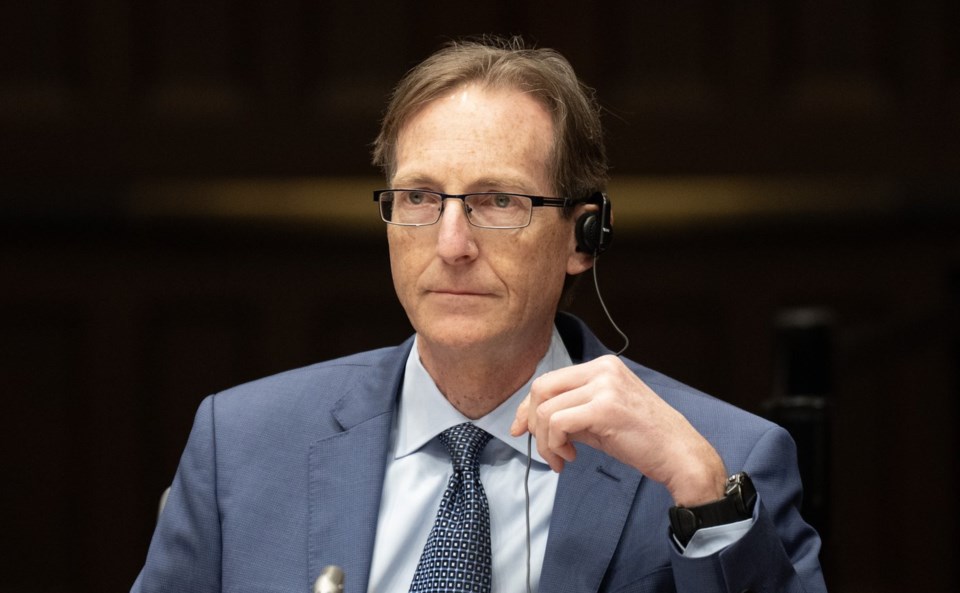VICTORIA — The head of BC Ferries welcomes plans to expand Canada's shipbuilding industry, but said future vessel procurements must be "free from political interference" after lessons learned from the so-called fast ferry scandal of the 1990s.
Nicholas Jimenez, BC Ferries president, said his organization always prefers to build new ferries at home, but any financially responsible program must meet "certain realities," including local shipbuilding capacities, fixed costs, guaranteed delivery dates, and an "open and competitive" process to avoid past mistakes.
"You have to have procurement processes that are open, that are competitive and free from political interference, and that is a direct learning from the past," he said in an interview Wednesday. "That is the expectation that I think British Columbians have of ferry procurements, and that will be true for future ferry procurements."
Former New Democrat premier Glen Clark wanted to revive B.C.'s shipbuilding by ordering three catamaran-style fast ferries at a cost of $210 million, only to see their final costs rise to $463 million.
The vessels had technical defects and proved unsuitable for local waters during their brief use, before being put up for sale and auctioned off for less than $20 million in 2003.
BC Ferries continues to face criticism for purchasing four new vessels from a state-owned Chinese shipyard. Critics have included unions, the industry itself and politicians at the provincial and federal level.
Jimenez has said no Canadian shipyard bid for the contract because of lack of capacity.
Jimenez, who spoke at Tuesday's Made in Canada: Ferries and Rail Summit in Hamilton, said the experience of other countries has shown that it could take anywhere from 10 to 20 years to build up a competitive shipbuilding industry under an all-in approach.
"The problem is, it really depends on the level of investment and ... the outlines of the industrial strategy that are put in place to make this happen," he said.
It also depends on whether Canada chooses to specialize in shipbuilding, ship-repair or ship-recycling, Jimenez said, adding that it is up to the industry as well government to grapple with these questions.
"Where do you want to play? Where do you think you can be sort of successful, not just in a domestic market, but also internationally?" he said.
The question has gained urgency as two foreign companies, one based in Germany, one in South Korea, are competing for a contract to replace Canada's aging fleet of submarines.
Jimenez said he is "not frustrated at all" when asked about Canada talking about increasing its shipbuilding capacity, while contracts continue to go to foreign bidders.
"It's a recognition of where the industry is at today," he said. "I think the bigger and more important question is, 'where do we want the industry to be?'"
Jimenez said the goal of the Made in Canada summit was to bring "ambition into focus" by talking about the things that need to change.
"We talked about the reality that there has to be cost competitiveness, because you can't put that on either a ferry company or ferry users," he said.
The summit also included federal Transport and Internal Trade Minister Chrystia Freeland, who said in June that she was "dismayed" by BC Ferries' decision.
Jimenez said BC Ferries "were surprised and disappointed" when Freeland had made the comments, because it didn't reflect an "understanding of the situation" at the time and "it didn't reflect an awareness of the engagement" that BC Ferries had not only with her ministry, but others in Ottawa.
"I think there's a different conversation happening today," he said. "I think the conversation today is less about the decision we made, and it's more about what needs to be true in the future, so that that decision might be different."
BC Ferries has yet to reveal the cost of the four ferries commissioned in China, but Jimenez repeated earlier comments that BC Ferries would have spent up to $1.2 billion more to go with a European shipyard.
Canada Infrastructure Bank had contributed $1 billion to finance the purchase of the vessel before Freeland's criticisms.
Housing and Infrastructure Minister Gregor Robertson told a federal committee examining the loan in August that he looked into reversing the deal, only to find out that the decision made in March had been executed.
When asked whether he felt a personal affront by Robertson's attempt to reverse the loan, Jimenez said BC Ferries is focused on the getting the procurement completed.
"That is what I am focused on," he said. "We really don't spend a lot of time on the peripheral stuff."
This report by The Canadian Press was first published Sept. 3, 2025.
Wolfgang Depner, The Canadian Press




